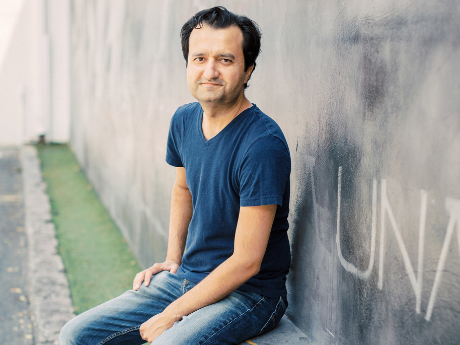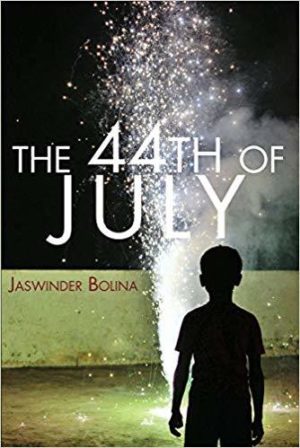In Their Own Words
Jaswinder Bolina on “Pornograph, with Americana”

Pornograph, with Americana
Don't move to Calgary, Apna,
have sex! possibly even with me
if you're willing, not even in wedlock,
possibly backwards with one knee
on the vanity, the shower heaving
steam to the Big Band webcast
out of KCEA, Atherton, my mother
napping downstairs in the great room,
she won't know you scaled the carport,
ducked an eave with a joint and a sixer
of Stroh's, my kurta in ribbons,
your lengha undone, I put every part
of you inside my mouth and bite down
a little as if I'm a rototiller in heat,
you the agitated earth, and I love you,
honest injun! while the sun slinks
behind the Fitch's Big Boy across
the interstate, fireflies make erratic
synapses above the drainage ditches,
the fir trees sway like frat boys
at a kegger, and the neighbors
who watch us framed in the naked
window, who wish us deported
into a darker corner of the duplex,
they can clench their hymnals, Apna,
and glare, we won't go anywhere
Waheguru! Waheguru! we won't go.
From The 44th of July (Omnidawn, 2019). All rights reserved. Reprinted courtesy of the author.
On"Pornograph, with Americana"
I wanted to get the words into my poem that nobody else would think to put into their poems. Certainly, those words make plain certain artifacts of ethnicity, race, and culture, but I have trouble with the idea that my use of lengha or kurta or my naming a character Apna or that the poem sings, at long last, Waheguru are anything other than really, truly, and ordinarily American things. Poets in this country have referenced their clothing and name-dropped their friends and sung their hallelujahs for generations without any differentiation between their writing and the American character. In this, "Pornograph, with Americana" isn't all that different from the poem about the doctor in Patterson dancing naked in front of his mirror while his wife and the baby and Kathleen are sleeping. Of course, my poem does intend to call a reader's attention to the ways in which we normalize one set of experiences while exoticizing and alienating another, and the poem intends to do this by juxtaposing one kind of diction with another, but the greater intent here is to make the act of differentiation feel stranger than the act of naming.
In other poems in The 44th of July, I make hideous mention of Mitch McConnell and drone pilots, deliberate references to Yellow Tail wine and Tempur-Pedic mattresses, and casual citations of samosas and mimosas too, and in every case, I'm using the language that occupies my life. At first blush, it doesn't seem as if that language would be so different from the language that occupies the lives of those around me. Other people must listen to the news and drink cheap liquor and pass joints around their bonfires, but somehow the words and phrases that constitute their worlds are distinct from the phrases and words that constitute mine. This isn't to say one vocabulary or syntax is more or less credible than another, but I have been thinking lately that this, too, is what we mean when we call a body brown or black, other or American: that identity is a measure of how different our dictions are. "Pornograph, with Americana," then, is one experiment of many based on that premise.
Other than that, I wanted to depict a desi version of mischief, sexuality, and glee. The recent uptick in the publication and celebration of stories by and about people of color is heartening for sure, but so much of that uptick fixates on hardship, suffering, and misery. Those are essential facets of the minority experience in this country, but so too are our experiences of joy. To participate in our own joy, to be carefree for once, can feel like its own brand of transgression. But we can be happy here. This, too, is why we are essential to America.



